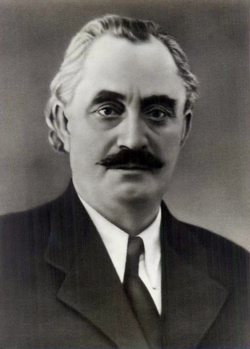Government Policies
Foreign Policy
The government lead Bulgaria out of international isolation by concluding a peace treaty with the Allies of World War II and further engagement with the USSR and the countries with pro-communist governments. Opened on July 29, 1946, the Paris Conference ended on February 10, 1947 with the signing by the belligerents of the 1947 Paris Peace Treaty. Bulgaria was represented by Kimon Georgiev, Alexander Obbov and Traicho Kostov, who signed the peace treaty on behalf of Bulgaria, which came into force on September 15 of the same year. Bulgaria retained its territory from January 1, 1944 and obligated to pay reparations of $45 million in goods to Greece for a period of eight years. [4] The strength of the Bulgarian army was reduced to 65,000 people. During implementation of the treaty, Yugoslavia waived reparations from Bulgaria. The Fatherland Front (Bulgaria) government accepted the idea of the Comintern for the existence of a Macedonian nation and began preparations for handing over Pirin to Yugoslavia. [5]
Internal Policy
A two-year national economic plan (1947–1948) was adopted, a youth brigadier movement was organized, and measures were taken to strengthen labor cooperative farms. [6] On August 26, 1947, the 6th Great National Assembly voted "Law on the dissolution of the Bulgarian Agrarian National Union and all its sections". Also during this government ministry, there were initiatives for the nationalization of enterprises, mines and banks and ongoing land cooperativization. On December 6, 1947, the new constitution of the People's Republic of Bulgaria came into force, which provided the legal basis for the government. [7]
This page is based on this
Wikipedia article Text is available under the
CC BY-SA 4.0 license; additional terms may apply.
Images, videos and audio are available under their respective licenses.
